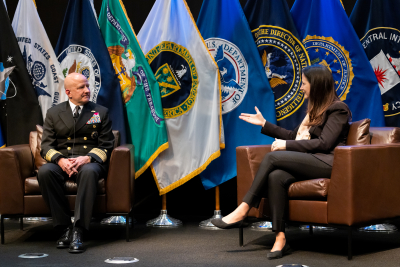New Duties of Intelligence Agency in Response to the Pandemic of COVID-19
Terrorism
Views. 1343
Abstract
Purpose: During the pandemic of COVID-19, we have again felt the importance of 'information' and have also realized that medical and scientific technology alone cannot control the pandemic caused by disease. Hence, it is intended to discuss the role of intelligence agency under such uncertainties.Method: In order to study such social phenomena, the pandemic of COVID-19 situation has been analyzed over the past two years as well as the methods to collect the necessary information through many existing literature and data. The analysis attempted to interpret the meaning of the phenomenon through the intuitive insight of the researcher.
Results: The result is that people's lives, as with COVID-19, may become insecure and unpredictable overnight. Furthermore, despite medical and scientific technology and development, the COVID-19 virus has expanded to delta mutations and omicron mutations, and hence, it is still unknown as to when this uncertain situation will end, which will have a direct impact on the national security.
Conclusion: It is of the view that the medical and scientific technology alone cannot control situations such as the pandemic of COVID-19, and the ‘power of intelligence’ to prepare for and against such scenarios in the future should be supported, and this duty will become a new task for the intelligence agency.
[Keywords] COVID-19, Pandemic, National Security, Intelligence Agency, Duties
References
[1] Lee BMS. A Comparative Study of the Impact of the Spanish Influenza in the 20th Century and the outbreak of the Covid-19 Pandemic in the 21st Century on the African Church and Society: Ecotheological Perspective. Mission and Theology, 52, 139-170 (2020).
[2] Kim SK. Several Problems on Estimation of Blood Alcohol Content by Widmark Formula. Journal of Legal Studies, 44(1), 198-199 (2020).
[3] Kim JH & Park JY. Social Impacts of Covid-19 and SDGs Policy Issues. The Journal of Asian Studies, 23(3), 1-42 (2020).
[4] Cha YR. News Article Analysis of the 4th Industrial Revolution and Advertising Before and After Covid-19: Focusing on LDA and Word2vec.The Journal of the Korea Contents Association, 21(9), 149-163 (2021).
[5] Jung BS & Choi JH & Jun YG. The Effect of Military Academy’s Writing Course for Military Cadets’ Writing Proficiency. International Journal of Military Affairs, 2(1), 9-17 (2017). [Article]
[6] Jung BS. Factors Affecting Korea Army Officers’ Achievement in Professional Development Education. International Journal of Military Affairs, 2(2), 1-7 (2017). [Article]
[7] Lee S & Baek S & Jo S. A Study on Role Conflict of Korean Security Police -Focusing on Working Period-. Regulations, 6(1), 43-54 (2021). [Article]
[8] Lim YJ & Bang WS & Park GY. Factors of the Job Stress of Non Commissioned Women Officers. International Journal of Military Affairs, 4(1), 12-19 (2019). [Article]
[9] Noh HC. Legitimacy of Disposition of Ex Officio and Dismissal of a Police Officer Appointed by the City Council for Causing a Drunk Driving Traffic Accident. Journal of Labour Law, 69, 268-272 (2019).
[10] Kim AR & Kim EJ & Yoon SJ. Current Status and Reform Tasks in Life Cycle Management of Korean Health Technology for the Fourth Industrial Revolution Era. Health Policy and Management, 30(3), 270-276 (2020).
[11] Sarfraz Z & Sarfraz A & Iftikar HM & Akhund R. Is Covid-19 Pushing us to the Fifth Industrial Revolution (Society 5.0)?. Pakistan Journal of Medical Sciences, 37(2), 591–594 (2021).
[12] Kim SH & Kim MK. The Fourth Industrial Revolution and the Education of Arts and Humanities -With focus on the Field of Medicine-. Journal of Humanities, 69, 77-98 (2018).
[13] Byong DS & Moon HJ. Who Suffers the Most Financial Hardships due to Covid-19?. Korean Journal of Social Welfare, 73(3), 9-31 (2021).
[14] Park MH. Post-traumatic Stress Disorder Nurse in Republic of Korea. International Journal of Human & Disaster, 2(1), 4-8 (2017). [Article]
[15] Shin HJ. Study of Major Issues of Introduction of Korean Clare’s Law and of Improvement Measures for the Public Security Policies. International Journal of Police and Policing, 2(1), 42-47 (2017). [Article]
[16] Jung BS. Development of Evaluative Indicator of Safety Education for Korea Army. International Journal of Crisis & Safety, 3(1), 25-31 (2018). [Article]
[17] Ahn HS & Seo JH. New Income Security in the Era of Uncertainty after the Covid-19. Korean Journal of Labor Studies, 26(3), 63-118 (2020).
[18] Iizuka M & Ikeda Y. Regulation and Innovation under the 4th Industrial Revolution: The Case of a Healthcare Robot, HAL by Cyberdyne. Technovation, 108, n102335 (2021).
[19] Jo SG. Terrorism Crisis on Northeast Asia. International Journal of Crisis & Safety, 5(1), 35-42 (2020). [Article]
[20] Lee S. The Trump Administration’s Negotiation Strategy towards the North Korean Nuclear Crisis: South Korea’s Response. International Journal of Crisis & Safety, 6(1), 10-17 (2021). [Article]
[21] Jo SG. The United Nation's Response Strategy for North Korea's Denuclearization. International Journal of Military Affairs, 3(2), 20-28 (2018). [Article]
[22] Back SC & Sung YE & Laprade J. The Effect of Terrorism Risk Perception and Agency’s Interaction on Police Homeland Security Preparedness. International Journal of Police and Policing, 2(1), 7-13 (2017). [Article]
[23] Nam J. Measures to Revitalize Resident Participation in the Self-governing Police System. Regulations, 6(3), 29-38 (2021). [Article]
[24] Kim TM & Park HY. Characteristics of Legal System related to Security in Republic of Korea. International Journal of Protection, Security & Investigation, 2(1), 25-32 (2017). [Article]
[25] Park DG. The Problems and Lessons of Emergency Management in Korea: With the Case of Covid-19. Korean Association for Public Security Administration, 17(3), 127-150 (2020).
[26] Park DK & Kim TM. Main Issues and Revisions of ‘Security Industry Act’. Korean Police Studies Association, 9(1), 3-26 (2010).
[27] Oh JH. Trends and Utilization Plan of Global Private Security Industry's Untact Control Techniques. Korean Society of Private Security, 19(4), 247-270 (2020).
[28] Kim DW. An Evaluation of the Required Arrangements for Comprehensive Regulation of the Private Security Industry. International Journal of Protection, Security & Investigation, 3(1), 1-6 (2018). [Article]

? Source: dni.gov
